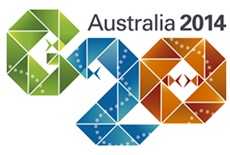G20 agrees on automatic sharing of bank information
22 Sep 2014
Finance ministers of the Group of 20 major economies on Sunday agreed on automatic sharing of all bank information with tax authorities at the end of each year, starting 2017, in a major step that will help India track and recover black money stashed abroad.
 The deal will not only allow the countries to extract bank details for future, but they can also avail account balance information of the past five to six years upon request, an official source said at the end of the two-day summit.
The deal will not only allow the countries to extract bank details for future, but they can also avail account balance information of the past five to six years upon request, an official source said at the end of the two-day summit.
"We endorse the finalised global Common Reporting Standard for automatic exchange of tax information on a reciprocal basis, which will provide a step-change in our ability to tackle and deter cross-border tax evasion," a G20 communique issued on Sunday said.
"We will begin exchanging information automatically between each other and with other countries by 2017 or end-2018," the statement added.
The Organisation for Economic Co-operation and Development (OECD) also declared the end of bank secrecy, saying key measures agreed upon at the G20 finance ministers and central bankers' meeting in Cairns, Australia, will close loopholes that allow companies to hide profits overseas.
India's minister of state for finance and commerce Nirmala Sitaraman welcomed the new global standard on automatic exchange of information, which would enable the tax authorities of both developed and developing countries to receive information about taxpayers hiding their money in offshore financial centres and tax havens through multilayered entities with non-transparent ownership.
''This would be the key to prevent international tax evasion and avoidance and would be instrumental in getting information about unaccounted money stashed abroad and ultimately bringing it back,'' she said.
For the government headed by Prime Minister Narendra Modi, whose first initiative was the setting up of a Special Investigation Team (SIT) to examine all the issues connected with black money, the new global standard on information sharing comes as a big morale booster.
''We believe that as far as possible, the new global standards on automatic exchange of information should be implemented with a common timeline with coverage of as many countries as possible. In addition to providing a critical mass to the success of the new standard, this would also be cost effective for financial institutions,'' Sitaraman said.
She said 46 countries, including India, have agreed for a common timeline to exchange information automatically from 2017 and everybody should join now.
She said the exchange of information on automatic basis under the new global standard will be on a fully reciprocal basis, as should be the arrangement between sovereign countries and countries must make necessary legislative changes in their domestic laws to enable them to provide the same level of information to other countries as they would be receiving from those countries.
The director of the OECD's Centre for Tax Policy and Administration, Pascal Saint-Amans, said the decision to introduce a common reporting standard for automatic information sharing was a "game changer" in the global fight against corporate tax evasion.
"Five years ago, bank secrecy was the rule in many countries, starting with the major financial centres - Switzerland, Singapore, Hong Kong, Luxembourg," he told a forum in Sydney. "Today, bank secrecy is over. All these jurisdictions have committed to exchange information automatically. There is no safe place to hide left."
The OECD this month unveiled plans to tackle profit shifting and tax avoidance by multinational corporations. The plans include an agreed push to force companies to report their financial activities overseas, as well the introduction of new treaty provisions to allow governments to tax companies at an international level.
Saint-Amans, who is in Australia for the G20 meetings, said country-by-country reporting - where companies are forced to report their sales, profit and tax in every company in which they operate - was another significant milestone.
"If all your profit is in Bermuda, your activity is here in Australia and your market in Europe, I wish you good luck. You may want to reconsider before filling in a country-by-country report."
Sitaraman also welcomed the agreement on Base Erosion and Profit Shifting (BEPS), which has been a cause of concern for developing and emerging economies for long as it eroded their tax base depriving them of much needed resources for developmental activities while providing an unfair competitive advantage to multinational enterprises (MNEs) vis-à-vis domestic companies having no opportunities for adopting BEPS strategies.



















